At Rukmani Trust, we are committed to making quality education and skill development available to rural India. With the Covid-19 pandemic, it was a given that we had to rely on the power of technology to bridge the rural-urban divide and ensure inclusive education.
Online education, however, comes with its own set of challenges, one of which we experienced closely. Many students, particularly in government and government-aided schools reported loss of interest in learning when it came to the online mode. It was this ennui, experienced by students that led to a team of TISS certified Master Trainers along with the resource team led by Dr. Amina, Associate Professor at CETE, TISS, to design and pilot the first LeaP-Quest.
Simply put, a LeaP-Quest is a blended lesson format designed by combining the approaches of constructive learning and inquiry based learning. As opposed to passive learning, it enables students to use technology to conduct in-depth research on any topic and then go on to create and present the learning artifacts based on the challenges given to them.
The first LeaP-Quest was conducted on the topic of “Communicable Disease” that saw a participation of around 65 students where they were asked to select any communicable disease and encouraged to conduct their own research. It also offered students the opportunity to interact with doctors and other experts to clarify any doubts, which arose during their research work. A hands-on approach such as this evoked a lot of interest in students. Not only were students found to be more engaged in the issue they also went on to display critical thinking skills.
A successful pilot, in turn, led to developing a detailed manual to enable teachers to replicate the LeaP-Quest on communicable diseases with their students in different states. This manual was also translated by the implementing partners in the respective state languages.

Propelled by the success of this experiential format came an International LeaP-Quest that focused on the theme of “Reducing Carbon Footprint for a Better Tomorrow”. The theme encouraged students not only to explore the concept of carbon footprint but also its impact on our daily life including how it affects climate change. It also saw participation by experts in the field who shared valuable insights about the topic. Mr. Kevin Sullivan researcher at Trinity university and Dr. Becky Long from Trinity university who spoke about climate change & its impact. The students were also joined by Dr. Amyn Poonawala from California, USA, who shared valuable information about forest fires and dry lightning strikes that occur due to global warming and climate change.
This LeaP-Quest once again saw students showcasing various projects aimed at mitigating carbon emissions. Some of the highlights included creation of an engaging game to sensitize the community on ways of reducing carbon footprint, creating alternative solutions for reducing the carbon emission caused due to the transportation sector, and a lot more. Students also got the opportunity to meet Mr. Anirban Ghosh, Chief Sustainability Officer, Mahindra Group, in the interactive Expert Session on new & upcoming technologies being built to reduce carbon emission and upcoming job opportunities in the field of environment.
Since April 2021, Rukmani trust has been supporting the resource team at CETE, TISS in conducting these LeaP-Quests and also providing professional development opportunities to teachers in Assam through Digital Badge courses. Up until February 2022 around 31 Leap-Quests have been successfully organized and implemented across the country with an outreach of about 4500 students.
Leap-quests have definitely taken the ennui out of online learning as students have shown keen interest in this form of experiential learning. The highlight of these Leap-Quests is also that students are able to collaborate with their peers across states in order to create projects, with teachers acting as facilitators.
Enough & more studies have shown the benefits that accrue with hand-on learning. One study compared test scores of 8th graders who were lectured about water quality as opposed to students who built a water purification device. No marks for guessing that the students who went through active learning saw much higher test scores.
We sure hope to bring many more learning-by-doing opportunities to students in rural India through a participatory style of education!

